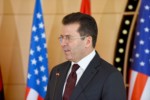The loss of American realism in the region?
The return of the big Russian and Turkish “brothers”
Chinese geopolitical money
The European Union must learn very quickly to manoeuvre in this area of latency
European policy in the Western Balkans at a cross roads
Andi MUSTAFAJ: Member of young leaders worldwide of SESC
Of all the epithets often attributed to the Balkans, that of being a powder keg, referring to the region’s ability to destabilise Europe from the end of 19th century on, is undoubtedly the most fascinating, the most misunderstood and especially, the most underestimated.
It especially affects the Western Balkans, an area covering Croatia, Bosnia-Herzegovina, Montenegro, Albania, North Macedonia, Kosovo and Serbia. This region, which is twice as small as the metropolitan area of France, has suffered many battles, whether this was following the dissolution of the Ottoman Empire, during the events triggering the First World War, the rise of communism and the wars following the dissolution of Yugoslavia. In response Europe has almost always appeared overwhelmed and slow, misunderstanding the passions that flow through the region and the complexity of the conflicts.
Since the 1990’s, this region, which is deeply European because of its history, its values and aspirations, has formed a strong attachment to the perspective of joining the European Union. For a time, this led to nascent convergence of a kind; in terms of the political goals of the region’s States, carried along by ideals of democracy, the rule of law and economic prosperity. It was shared by the Union itself, which
stepped up its efforts to establish its presence and support to the Balkan States’ assimilation of the famous acquis communautaire, the only requirement, in its opinion, of a sufficient level of development to become a Member State. This is how the membership process has gradually embraced the Western Balkans, with Croatia’s membership in 2013.
However, the recent crises which have affected the European Union and its Member States, involving the economy, Brexit, the migrant crisis and even the rise of populism, have somewhat dispelled the prospect of the Union’s enlargement to the countries of the Western Balkans. This is a crucial and possibly a major destabilising fact for the region, since it is creating a de facto isolation from the only common goal that the countries of the region had.
The weakening of this goal and the Union’s lack of any alternative plan puts the Western Balkans back in the centre of the complex power game between the USA, Russia, Turkey and China.
This power struggle of uncertain consequence seemingly reveals a loss of realism on the part of the USA regarding the balance that guarantees the region’s stability, the return of the big Russian and Turkish “brothers”, as well as the Western Balkans exposure to major development projects that China has around the world.
The loss of American realism in the region?
Contrary to what its current, strong influence in the region might lead us to believe, the USA’s presence in the Balkans, especially in the Western Balkans, is recent. It began after the fall of the Berlin Wall and has grown around two interdependent axes.
The first of these is the military protection via the USA’s role in the 1995 NATO bombings of Bosnia-Herzegovina and Serbia in 1999. The second has been the proposal for an alliance to counter the threat that Russia has represented for the region’s stability, through membership of NATO by Croatia, Albania, Montenegro and soon North Macedonia.
These two axes are now under challenge by Donald Trump’s new policy, which brings the USA’s focus back to itself with the “America First” doctrine. The military threat has been replaced by the one made against the economy, as the main geopolitical risk seen by the USA.
As a result, preferring trade sanctions to military commitment Donald Trump, incidentally, has not hesitated to withdraw his troops from the theatres of war without informing his allies, or to criticise NATO quite sharply. This re-positioning influences de facto the USA’s strategy in the Western Balkans, a region without any commercial influence for them and in which the role played by Vladimir Putin is
no longer seen as a danger as he was by the previous American administration. The quest for a solution at any price to guarantee the normalisation of relations between Kosovo and Serbia seems to have become the USA’s priority, meaning that it might lose its sense of reality regarding the nature of the conflict in the Western Balkans.
The USA have declared that they support a solution that would be a common agreement between the Serbs and the Kosovars, even if this solution means an exchange of territories between the two countries. This idea, supported for a long time by a part of the Serb political classes, was then put forward by the President of Kosovo in the summer of 2018. The exact arrangements for this have not been revealed, but it appears that three Serb majority communities in the north of Kosovo and the Albanian majority valley of Presevo in Serbia are affected.
This new position on the part of the USA, which until now had defended the recognition of Kosovo’s original administrative borders, is highly dangerous. Without a settlement to the problem of the Serb population in Kosovo (only 40% of Kosovo Serbs live in the territories under consideration), this proposal would imply two immediate consequences. The first would be the re-opening of an ethnic based debate over the borders, which might have a knock-on effect with other countries, starting with Bosnia-Herzegovina and North Macedonia. The second would be the direct impoverishment of Kosovo, because most of the country’s water sources are to be found in the territories in question.
The USA’s support is all the more surprising since it does not take into account Kosovo’s institutional situation, in which the President of the Republic is not competent to negotiate agreements of this type. It also contradicts the position of the Kosovar Parliament and that of other countries in the region, like Croatia and Albania.
The return of the big Russian and Turkish “brothers”
For more than 15 years Russia and Turkey have experienced a similar dynamic that has aimed to recover a share of their previous role and influence in the world. The Western Balkans are an inevitable juncture in terms of the influence of these two countries. Russia’s spheres of influence, marked by the historic role that the Czars played as the protectors of all Slavic people adhering to the Orthodox Church, meet here with those of Turkey, marked by the presence of the Ottoman Empire and the Muslim faith over several centuries. However, instead of confrontation, these influences now seem to overlap, and even share a complementary trajectory that is highly destabilising for the Western Balkans.
Russia and Turkey cannot put forward a project that will unify the countries of the region like that of membership of the European Union, nor one of military protection comparable to that of NATO (of which Turkey incidentally is a member). Nor do Russia and Turkey have the necessary economic resources to weigh significantly over the countries of the region. It is a new balance that the two “big brothers” have to find, in which destabilisation and the confusion of values seem to be the only means for them to ensure any significant influence over the region.
Hence the British intelligence services attribute the attempted coup of 2016 in Montenegro to Russia. The latter also maintains its influence, so that Kosovo’s independence remains unrecognised, notably providing financial support to the secessionist goals of the Srpska Republic in Bosnia-Herzegovina. Russia is also undertaking disinformation campaigns, like the one against the Macedonian referendum regarding the agreement found with Greece for the definition of its name. This campaign, which was accomplished via the provision of financial support to pro-Russian groups and even the
diffusion of fake news on the social networks, caused a diplomatic crisis with Greece and pushed the then American Secretary of Defence, Jim Mattis, to travel to Skopje to support the “yes” vote and announce a deepening of cooperation in terms of cybersecurity.
Turkey for its part is founding itself on the so-called “neo- Ottoman” political doctrine, promoted since Recep Tayyip Erdogan’s arrival in office in 2002, in which Islam and cultural diplomacy play the main role. Hence Turkey has increased the renovation and construction of mosques across countries like Bosnia-Herzegovina, Kosovo and Albania. Although the opaque nature of financing paths makes it impossible to see what the extent of this support really is, we should note that it occurs in strategic places of worship, such as the mosque of Mitrovica, the biggest in Kosovo, or at the future mosque of Tirana, designed to become one of the biggest places of worship for the Muslim faith in the Western Balkans.
Turkey is also starting to deploy a strategy of influence; via education, with the creation of the Maarif Foundation that enjoys important financial means and whose aim it is to finance the establishment private Turkish schools, especially in the countries of the Western Balkans.
This influence emerges in the strong personal relationship that the Turkish President Erdogan has with his Kosovar counterpart, Hashim Thaçi, Albanian Prime Minister, Edi Rama and the political leader of the Bosniaks, Bakir Izetbegovic, who for example were invited to Erdogan’s daughter’s wedding in May 2016.
The consequences of the return of the Turkish and Russian “big brothers” in the region are difficult to assess for the time being. This progressive, consolidating presence is widespread amongst the population, leading to the danger of destabilisation, if there were to be a major crisis that upset the region.
Chinese geopolitical money
Whilst being the most recent, China’s game of influence in the Western Balkans is not a new phenomenon. After the Second World War, strong relations, based on shared communism existed with Albania and to a lesser a degree, Yugoslavia.
The globalisation strategy launched by Beijing in 1999 justifies this recovery in influence. The strategy, based on economic expansionism, aims to encourage Chinese businesses to invest abroad. In 2012 it led to the creation of the “16+1 initiative” in which China and 11 EU Member States, together with Albania, Bosnia-Herzegovina, North Macedonia, Montenegro and Serbia take part.
In 2013, to complete and make this doctrine operational, China launched its “new Silk Road”. This colossal project, which ultimately will involve 68 countries aims to improve China’s maritime, rail and road connectivity. One of the land junctions of this new road links the Greek port of Piraeus to the Dutch port of Rotterdam via the Western Balkans.
China’s immediate interest is the construction of an efficient land transport system to link Piraeus to Rotterdam. But the countries of the Western Balkans do not have the financial resources to fund these projects and the European funds that do exist for this are extremely complex. To palliate these difficulties, China offers loans targeting the construction of roads or railways, and it conditions them by stipulating that a share of the investment is to be undertaken by Chinese companies.
Hence China has financed major projects involving segments of motorway in North Macedonia, Serbia, Montenegro, Albania and Bosnia-Herzegovina. It also financed “the Sino-Serb Friendship Bridge” over the Danube inaugurated in 2014. In 2017 China and Serbia signed a contract for the construction of a rapid rail link between
Belgrade and Budapest, with a loan of a nearly one billion € from the Chinese State.
China is also acquiring businesses in strategic sectors. In Greece, with the help of the State shipowner, COSCO, it has acquired a majority share in the port of Piraeus and has invested nearly half a billion euro there. In 2016 in Albania, the Chinese State company China Everbright Limited acquired the country’s only international airport and Geo-Jade Petroleum acquired Bankers, which runs the country’s biggest oil field. In Bosnia-Herzegovina and Serbia, China has purchased several thermal power stations.
For the time being China’s influence might seem an advantage to the region. Whilst facilitating a certain type of economic development, China has every interest in the region’s stability. It does not use its propaganda to convey an ideology and is not suggesting any political project.
But this assessment might be deceptive. The projects financed by China are being undertaken beyond ideas of economic profitability and the attribution procedures of public procurement. Hence, they are destabilising the functioning of the markets, encouraging a lack of transparency and the development of corruption. Moreover, if this trend is confirmed, in the end, via its control of a share in the debt of the Western Balkan States and its presence in strategic economic areas, China will have important and unpredictable means to effect pressure.
The European Union must learn very quickly to manoeuvre in this area of latency
The European Union absolutely has to gauge the opposite dynamic which is affecting the Western Balkans at present. To the growing, complex influence of foreign powers, which illustrate a
certain capacity for cohabitation, there is the mirrored promise of integration to the European Union, the prospect of which seems slowly, but surely to be drifting away.
The possibility of the powder keg exploding will be all the greater if this period of latency is prolonged. Whilst maintaining the project of the future and unity, which is intrinsically inherent to it, and which finds a natural place for the Western Balkans, the European Union has to adapt its strategy in response to the progressive deployment of these various strategic policies across the region.
Firstly, it must change the kind of presence it occupies in the Western Balkans, which is currently based on the idea of assistance and an overly formal approach. The European Union helps the countries in the region to transform economically and politically; it assesses and issues opinions on their progress. By nature, this presence is distant, it holds sacrosanct the idea that a country’s development is achieved via the formal adaptation of its domestic law to European norms and standards. This approach abrogates the Union of the results achieved by the countries in question. It must therefore be replaced by enhanced cooperation, which implies a more active role on both sides, giving value to real achievements and maintaining strong links that can guarantee that the path to EU membership remains the priority of the countries in the region no matter what.
Then the European Union must work towards filling in the gaps in which foreign powers have become trapped. The first gap involves emotion, used by Russia and Turkey, which plays on roots, history and religion. To fill this the EU must, as a priority, focus on new enhanced cooperation in education, whereby everything begins and ends in a society, together with the promotion of cohabitation models between Muslims and Christians, to be found in several of the region’s countries, as the best argument to counter religious extremism. The
second gap involves financial means exploited by China, which plays on the financing and investment requirements of the countries in the region. The EU must simplify and make its financing more transparent. It has to identify strategic areas of development to which it will facilitate access to specific funds and be actively involved in the completion of projects. The third gap involves psychology: the USA responded to this by playing the role of military protector. The EU must focus one of the chapters of its enhanced cooperation on the fight to counter terrorism, cross-border crime and cybersecurity. Loopholes in this battle, which still exist weaken both the countries of the Western Balkans as well as the EU itself, since both are affected by large criminal networks involving drug trafficking, propaganda campaigns and disinformation on the web and terrorist attacks. This joint protection will progressively have to be enhanced as the system of European Defence develops.






Leave a Reply